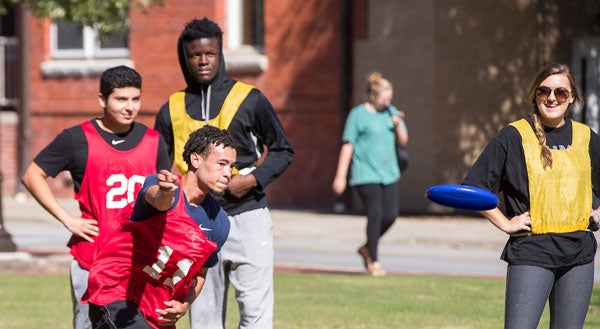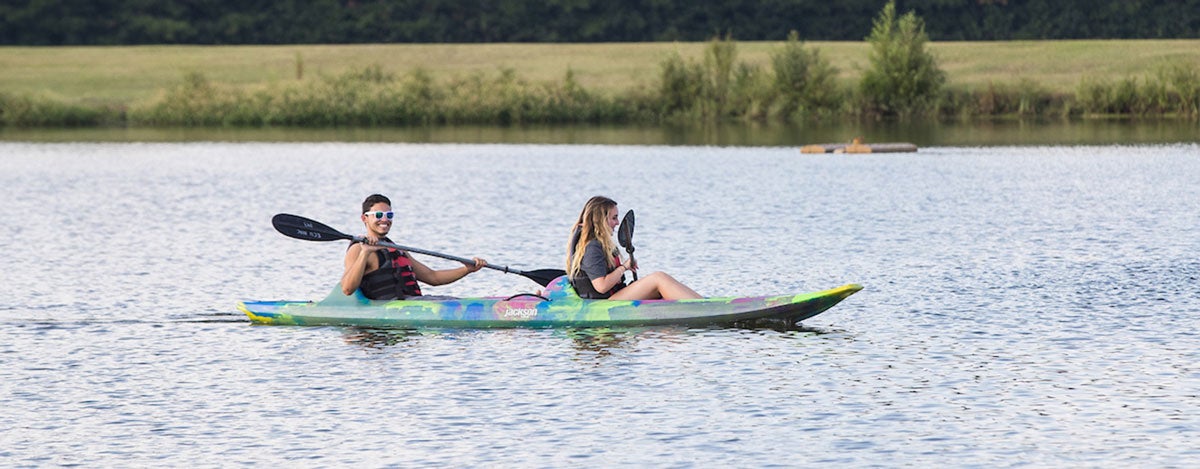JUST MOVE
ECU researchers weigh in on new physical activity guidelines
Some exercise – even in small doses – is better than nothing at all, say East Carolina University researchers and updated guidelines for physical activity from the U.S. Department of Health and Human Services.
“People have the idea that you have to engage in physical activity for a long time, like 30 minutes, and if you cannot do that then it is not worth it. We have an all-or- nothing mentality,” said Dr. Bhibha Das, assistant professor of kinesiology in the College of Health and Human Performance.

Students in a lifetime physical activity and fitness class play Frisbee on the mall in 2017. (Photo by Cliff Hollis)
But the second edition of the Physical Activity Guidelines for Americans released Nov. 12 shows some activity – even a few minutes at a time – provides health benefits and is better than being sedentary. Nationally, 8 percent of preventable deaths are caused by physical inactivity, according to the U.S. Office of Disease Prevention and Health Promotion.
“Start where you can and then build up over time to meet 150 minutes of moderate activity each week or 75 minutes of vigorous activity per week,” said Dr. Katrina DuBose, director of the Activity Promotion Laboratory at ECU.
The guidelines provide evidence-based recommendations for adults and youth ages 3 through 17 to safely get the exercise needed to maintain or improve overall health and reduce the risk of chronic disease.
New key guidelines include:
- Encouraging adults to sit less and move more. “Take short active breaks if you sit for over an hour,” DuBose said.
- Removing the previous recommendation of at least 10-minute bouts of physical activity. Evidence shows people can benefit from small amounts of moderate-to-vigorous physical activity throughout the day.
- Recommending light, moderate or vigorous activity for three hours each day for children ages 3 to 5. DuBose is conducting a study at ECU to identify the types of sedentary activities that preschool-aged children do during the day.
- Exercising consistently over time can lead to additional long-term health benefits such as improving cognition and reducing the risk of cancer, heart disease, dementia, stroke, high blood pressure, Type 2 diabetes and depression.
The guidelines remained the same for recommended amounts of physical activity for youth ages 6 through 17 and for adults.
Every day, youth ages 6 through 17 need at least 60 minutes of moderate-to-vigorous activity like walking, running or anything that makes their hearts beat faster. Children also need activities to strengthen muscles and bones, like climbing on playground equipment, playing basketball or jumping rope.
Adults should get at least 150 to 300 minutes of moderate-intensity aerobic activity, like brisk walking or fast dancing, each week. Adults also need muscle-strengthening activity, like lifting weights or doing push-ups, at least two days each week.
“I think it is important for people who want to become more active to find something they enjoy so it will make being active easier, and if a person is already active, they could try new activities so they do not get bored,” DuBose said. “Being physically active is a choice that is made daily and if we think about the immediate benefits – more energy, less stressed – this helps make the choice to be active easier.”
The major message with the revised guidelines is to engage in some physical activity rather than being sedentary, Das said. “Even if someone is doing light physical activity, that is better than being sedentary. Everyone was a beginner at one point, so we all have to start somewhere,” she said.
The Department of Kinesiology offers exercise programs on main campus in the FITT building and on the health sciences campus. For people affiliated with ECU, the Student Recreation Center and Health Sciences Center have options for students, faculty and staff to be active. There is also an Exercise is Medicine on-campus initiative, with events in the spring and fall focused on being physically active.
The department has ongoing studies that focus on ways to help people of all ages become more active. Visit https://hhp.ecu.edu/kine/ to learn more.
For more information on the recently released guidelines, visit www.health.gov.

Students participate in Beach Fest at the North Campus Recreational Complex. (Photo by Cliff Hollis)
